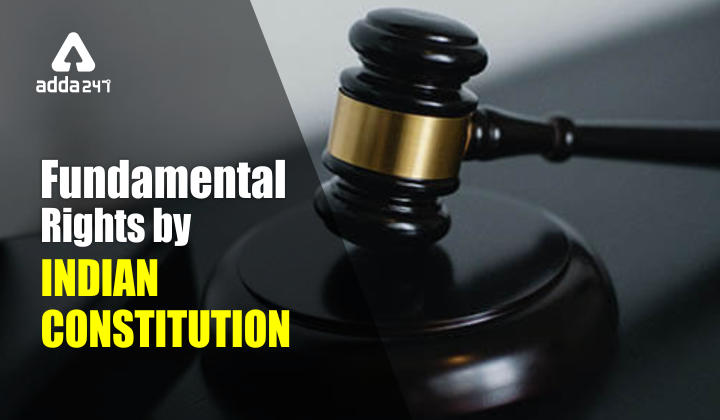Fundamental Rights 2022
The essential human, civil and political rights offered to every citizen irrespective of place of birth, religion, or gender are called fundamental rights. These rights are mentioned in the constitution of India from article 14 to article 35. There are 6 fundamental rights granted to the citizen of India essential for the society at a large and for personal good. Fundamental means a necessary base or a center of importance. Fundamental rights are the core principles issued by the government of India to every citizen to live freely in the country.
State Chief Minister and Governor
What are the Fundamental Rights?
- Article 14- 18: Right to Equality
- Article 19-22: Right to Freedom
- Article 23-24: Right against Exploitation
- Article 25-28: Right to Freedom of Religion
- Article 29-31: Culture and Educational Rights
- Article 32-35: Right to Constitutional Remedies
Read More About: Fundamental Rights of Indian Constitution
Fundamental rights: Right to Equality (Article 14-18)
- Equality before the law and equal protection of the law (Article 14)
There are two parts of article 14 which are equality before the law and equal protection of the laws. Equal protection of the law means that equality before the law means no individual citizen will enjoy special privileges by the state or the law. Equal protection of the law means that in equal circumstances all the citizens will be treated equally by the law.
- Prohibition of discrimination on grounds of religion, race, caste, sex, or place of birth (Article 15)
Prohibition of discrimination is divided into four categories that are as follows.
- Prohibition of discrimination [Article 15 Clause (1)]- The article prohibition of discrimination prohibits the state from discriminating against any individual or group of individuals. The four principles of non-discrimination are based on equality and dignity.
- Access to public places [Article 15 Clause (2)]- The article access to public places states that no citizen can be denied to access any public place like railway stations and libraries, places of entertainment, or the use of water facilities like Wells and tanks and roads.
- Protection laws for women and children [Article 15 Clause (3)]- Protection acts for women and children are made in the Indian constitution. There are reservations for women and free education for children as per the article.
- Reservation for backward classes [Article 15, Clause (4)]- The article authorizes the state to make special provisions for the advancement of the weaker sections of the society. The schedule caste, scheduled tribe, and other backward classes are recognized as weaker sections of the society by the government.
- Equality of opportunity and matters of public employment (Article 16)
Article 16 aims to provide equal opportunity to all the citizens of India with employment offered by States or its agencies. There is 5 clause of article 16 which are as follows.
- Equality of opportunity [Article 16 Clause (1)]- The article states that in matters of employment or appointment all the citizens should be given equal opportunity.
- Prohibition of discrimination [Article 16 Clause (2)] – This article prohibits discrimination based on religion, caste, sex, place of birth, and race or any of them in respect of any employment of the state.
- Residential requirements [Article 16 Clause (3)]- For public employment or appointment, it allows the parliament to make laws that require residential requirements.
- Protective laws [Article 16 Clause (4)]- This allows the parliament to make protective laws for the appointment or employment of backward classes who are not adequately represented in the service of the state.
- Preference to a certain person in religious institutions [Article 16 Clause (5)]- This allows the parliament to make laws that require only a person professing a particular religion to be appointed in the institution of that religion. Example- A Hindu can only be appointed as a priest in a Hindu temple.
- Abolition of Untouchability (Article 17)
This article has been incorporated in the constitution of India in Article 17. It states that untouchability has been abolished and the practice of untouchability is punishable according to the law.
- Abolition of titles (Article 18)
This article prohibits the state from conferring any title upon any person. The state is not preventive from awarding military distincts for honoring men for their acts of Valour.
Important Articles In Constitution of India 2022
Fundamental rights: Right to freedom (Article 19 – 22)
- Article 19 (1) guarantees all citizens 6 freedoms according to the 44th amendment act 1979 by the constitution of India.
- Freedom of speech and expression
- Freedom of peaceful assembly without arms
- Freedom of forming associations or unions
- Freedom of movement throughout the territory of India
- Freedom of residence and settlement in any part of the territory of India
- Freedom of profession, occupation, trade, or business
- Article 20: protection in respect of conviction for offenses.
Those who are accused of crimes are guaranteed protection in respect of conviction for offenses. Article 20 has three clauses which are as follows.
- Protection against ex-post-facto legislation- It states that a person is not punishable if he has done the act before the law has passed any declaration of the offense of the act.
- Protection against double jeopardy- It states that a person cannot be prosecuted and punished for the same a more than once.
- Protection against self-incrimination- The clause state that no person accused of an offense shall be compelled to be a witness against himself.
- Article 21: protection of life and personal liberty
It is the right to life and personal liberty it provides that “no person shall be deprived of his life or personal liberty except according to procedure established by law.”
- Article 22: protection against arrest and detention in certain cases
Article 22 is complementary to Article 21. It has two parts, clause (1) and (2) which deals with a person who is arrested under ordinary criminal law and various rights they are entitled to. The second part of the article consists of the remaining clause (3) to (7) which is concerned with persons who are detained under a law of preventive detention.
Fundamental rights: Right Against Exploitation (Article 23-24)
- Article 23- Prohibition of traffic in human beings and forced labor.
This article prohibits the trafficking of human beings and ‘Begar’. It also prohibits any form of forced labor.
- Article 24- Prohibition of employment of children.
According to article 24, the constitution prohibits children below 14 years of age from child labor. Any child cannot be employed in a factory or mine or any other hazardous employment who is under or below 14 years.
Fundamental rights: Right to freedom of religion (Article 25-28)
- Article 25- Freedom of conscience and religion
Promotes the spirit of secularism and recognized freedom of religion for every citizen in India.
- Article 26- Freedom to manage religious affairs
This gives the right of every religious order to establish and maintain institutions for religious purposes and manage its affairs in the matter of religion.
- Article 27: Freedom as to payment of taxes for promotion of any particular religion.
The state shall not compel any person to pay any taxes for the promotion and maintenance of particular religion or religious denomination.
- Article 28: Freedom to attend religious instructions in an education institution
Article 28 prohibits the imposition of religious beliefs by educational institutes on those who are attending them.
Fundamental rights: Cultural and Educational Rights (Article 29)
- Article 29-cultural rights of the individual as well as of minorities.
The article states that if a community or a section of people has its language, script, or culture they can conserve it in their ways without the interference of government
- Article 30- Right of minorities to establish and administer educational institutions.
If a minority section of the society wants to establish an educational institute the state cannot discriminate in granting aid to any educational institution because it is under the management of a religious minority.
Fundamental rights: The right to constitutional remedies (Article 32)
- Article 32- says that any citizen can reach the supreme court for any violation of fundamental rights against them.
FAQs on Fundamental Rights
1. What do you mean by fundamental rights?
Ans. Fundamental rights are the basic civil, political, and human rights granted by the constitution of India to every citizen.
2. What are the six fundamental rights of human beings?
Ans. The fundamental rights are the right to equality, right to freedom, right against exploitation, right to freedom of religion, cultural and educational rights, and right to constitutional remedies.
3. Which right was changed from fundamental right to legal right?
Ans. The right to property was changed from a fundamental right to a legal right.
Buy Prime Test Series for all Banking, SSC, Insurance & other exams



 Indian Olympic Medal Winners List Till N...
Indian Olympic Medal Winners List Till N...
 Who is the Inventor of the Gramophone?
Who is the Inventor of the Gramophone?
 HS Dhaliwal Appointed New DGP Of Andaman...
HS Dhaliwal Appointed New DGP Of Andaman...
